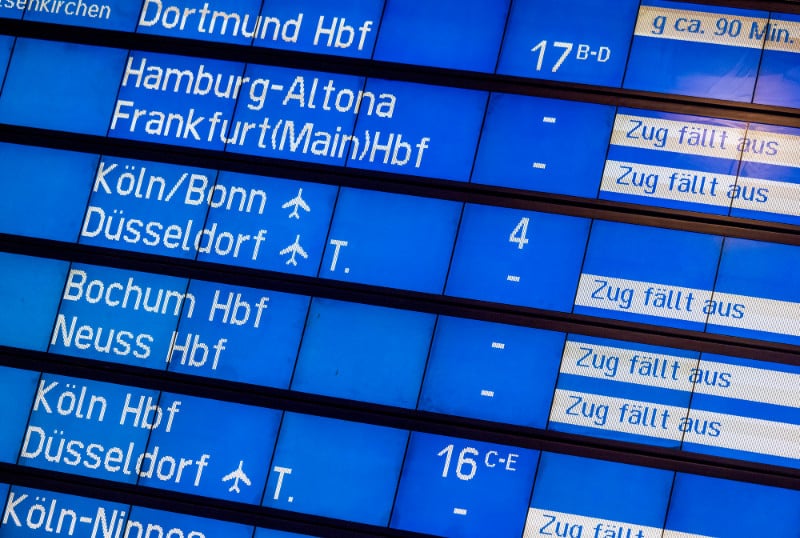Could Germany's rail strikes end sooner than expected?

The German train drivers' union is currently in the midst of a record-breaking strike as part of its bid to win better pay and shorter working hours from Deutsche Bahn. Is there a chance that the two sides could reach a deal before Monday?
Since the latest round of talks over pay and conditions kicked off last autumn, it's been an increasingly bitter fight between rail operator Deutsche Bahn and the GDL train drivers' union.
The latter, led by Claus Weselsky, has a reputation for being quick to resort to industrial action, putting the railways out of action for days on end.
But despite the union being known for its hardline tactics, the latest six-day national rail strike is unprecedented in Germany, costing the economy - and Deutsche Bahn - tens of millions of euros per day.
READ ALSO:
- How train travellers in Germany will be affected by the latest six-day strike
- German train drivers begin longest ever strike as fears over the economy grow
Against this backdrop, commuters may well be asking themselves whether this latest escalation could lead to a quicker resolution. Will Germany's national rail operator be willing to cave to the GDL's demands in order to avoid an almost week-long strike?
At the moment, it doesn't look it.
Why can't the two sides reach an agreement?
The dispute relates to a number of different issues that the GDL and Deutsche Bahn are still worlds apart on.
Interestingly enough, they have much less to do with money than with working conditions and the role of the union itself.
While the GDL is asking for an inflation bonus of €3,000 this year and a pay rise of at least €555 per month, the rail operator has offered a €2,850 bonus along with a staggered 12.5 percent pay rise over three years.
This could have been a starting point for talks, but Weselsky says he wants to see movement on one of the GDL's key demands - a 35-hour working week - before the union comes back around the negotiating table.
The GDL has been pushing for a cut in working hours from 38 to 35 for the same amount of pay - a proposal Deutsche Bahn has claimed is "unworkable" in light of labour shortages.
However, the rail operator did come towards the union ahead of this week's strike, offering an optional cut in hours from 38 to 37 by 2026.

A display screen in Düsseldorf on Wednesday morning shows that every scheduled train is no longer running due to the strike. Photo: picture alliance/dpa | Thomas Banneyer
Once again, this was rejected outright by union bosses, who claimed that the offer was nowhere near as good as it sounds.
For starters, the cut in hours wouldn't apply to all Deutsche Bahn staff, meaning shift workers would still be lumbered with the original longer hours. At the same time, the offer would be conditional on the staffing situation at the business, and people who opted to keep a 38-hour week would receive 2.7 percent more pay.
READ ALSO: Which train services are still operating around Germany?
According to the GDL, this would basically amount to a pay cut by default for those who wanted a shorter working week.
Another key issue is whether the GDL can negotiate on behalf of the dispatchers on the railways. The GDL is keen to expand its remit, while Deutsche Bahn has rejected this proposal.
What happens next?
At the moment, it appears the strike will drag on until its intended end time at 6pm on Monday - pending a significantly improved offer from Deutsche Bahn in the meantime.
Previous attempts by DB to scupper planned strikes through the courts have failed, so it seems like this option is also off the table.
That said, the fact that the six-day mega-strike has gone ahead as planned doesn't necessarily mean victory for the GDL.
According to Peter Renneberg, who advises trade unions on their strategy for industrial action, the latest strike does pile pressure on Deutsche Bahn - but it also increases the pressure on the GDL to obtain a good result and "save face".
With around 60 percent of the population opposing the strikes, it seems that the train drivers are also losing the PR battle - a key factor in trade union negotiations.
READ ALSO: 'Majority of Germans' don't support striking train drivers
To make matters worse, the GDL needs to find the money to at least partly compensate striking workers, meaning the ability to keep taking action partly depends on how well the union's coffers are filled.
This could mean the union has to show more willingness to compromise over the coming weeks, potentially agreeing to a third-mediation procedure in order to thrash out a deal.
Comments
See Also
Since the latest round of talks over pay and conditions kicked off last autumn, it's been an increasingly bitter fight between rail operator Deutsche Bahn and the GDL train drivers' union.
The latter, led by Claus Weselsky, has a reputation for being quick to resort to industrial action, putting the railways out of action for days on end.
But despite the union being known for its hardline tactics, the latest six-day national rail strike is unprecedented in Germany, costing the economy - and Deutsche Bahn - tens of millions of euros per day.
READ ALSO:
- How train travellers in Germany will be affected by the latest six-day strike
- German train drivers begin longest ever strike as fears over the economy grow
Against this backdrop, commuters may well be asking themselves whether this latest escalation could lead to a quicker resolution. Will Germany's national rail operator be willing to cave to the GDL's demands in order to avoid an almost week-long strike?
At the moment, it doesn't look it.
Why can't the two sides reach an agreement?
The dispute relates to a number of different issues that the GDL and Deutsche Bahn are still worlds apart on.
Interestingly enough, they have much less to do with money than with working conditions and the role of the union itself.
While the GDL is asking for an inflation bonus of €3,000 this year and a pay rise of at least €555 per month, the rail operator has offered a €2,850 bonus along with a staggered 12.5 percent pay rise over three years.
This could have been a starting point for talks, but Weselsky says he wants to see movement on one of the GDL's key demands - a 35-hour working week - before the union comes back around the negotiating table.
The GDL has been pushing for a cut in working hours from 38 to 35 for the same amount of pay - a proposal Deutsche Bahn has claimed is "unworkable" in light of labour shortages.
However, the rail operator did come towards the union ahead of this week's strike, offering an optional cut in hours from 38 to 37 by 2026.

Once again, this was rejected outright by union bosses, who claimed that the offer was nowhere near as good as it sounds.
For starters, the cut in hours wouldn't apply to all Deutsche Bahn staff, meaning shift workers would still be lumbered with the original longer hours. At the same time, the offer would be conditional on the staffing situation at the business, and people who opted to keep a 38-hour week would receive 2.7 percent more pay.
READ ALSO: Which train services are still operating around Germany?
According to the GDL, this would basically amount to a pay cut by default for those who wanted a shorter working week.
Another key issue is whether the GDL can negotiate on behalf of the dispatchers on the railways. The GDL is keen to expand its remit, while Deutsche Bahn has rejected this proposal.
What happens next?
At the moment, it appears the strike will drag on until its intended end time at 6pm on Monday - pending a significantly improved offer from Deutsche Bahn in the meantime.
Previous attempts by DB to scupper planned strikes through the courts have failed, so it seems like this option is also off the table.
That said, the fact that the six-day mega-strike has gone ahead as planned doesn't necessarily mean victory for the GDL.
According to Peter Renneberg, who advises trade unions on their strategy for industrial action, the latest strike does pile pressure on Deutsche Bahn - but it also increases the pressure on the GDL to obtain a good result and "save face".
With around 60 percent of the population opposing the strikes, it seems that the train drivers are also losing the PR battle - a key factor in trade union negotiations.
READ ALSO: 'Majority of Germans' don't support striking train drivers
To make matters worse, the GDL needs to find the money to at least partly compensate striking workers, meaning the ability to keep taking action partly depends on how well the union's coffers are filled.
This could mean the union has to show more willingness to compromise over the coming weeks, potentially agreeing to a third-mediation procedure in order to thrash out a deal.
Join the conversation in our comments section below. Share your own views and experience and if you have a question or suggestion for our journalists then email us at [email protected].
Please keep comments civil, constructive and on topic – and make sure to read our terms of use before getting involved.
Please log in here to leave a comment.